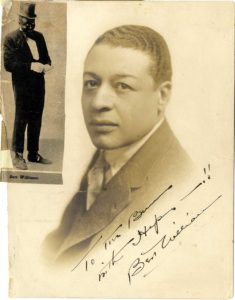Bert Williams (1873-1922) – Black Vaudevillian. Inscribed, signed photo of the legendary black star, circa 1916.
For 15 years, Bert Williams performed internationally, either solo or in a duo act until 1910, when Flo Ziegfeld hired him as the first black star of the iconic Ziegfeld Follies. Always appearing in blackface, audiences applauded his incredible comic talent and good looks. He made records said to have sold in the hundreds of thousands, made his home in New York City, and refused to perform below the Mason Dixon Line.
A captain in the California National Guard, in 1916, Bert Williams was literally instrumental in uniting two black music icons, Ragtime pianist, bandleader, and conductor, James Reese Europe (c.1880-1919), and Jazz composer, Noble Sissle (1889-1975), with Williams supplying private funding, recruiting, and drilling to establish the 15th Infantry (Colored) Regiment of the New York National Guard. Paid for with a $10,000 donation, likely from Williams himself, Lieutenant Europe and Sergeant Sissle added Puerto Rican musicians to a regimental band that, along with their wartime valor, would make history during World War I.
The 15th NY Guard arrived in France on New Year’s Day, 1918, where the combat group spent three months as stevedores before incorporating into the U.S. Army as the 369th Regiment. Again, due to America’s prohibition on integrating black and white troops, they were loaned to the French Army and reequipped with inferior rifles. In the Argonne Forest, Lt. Europe was the first black officer to lead black troops in battle. The “Harlem Hellfighters” became the first Allied regiment to enter Germany, the longest-serving U.S. frontline unit at 191 days, and the most highly decorated with every man awarded the Croix de Guerre, France’s highest military honor. And, unlike any other regimental band, the 369th’s toured and stepped to their “syncopated music,” and its ensemble was credited with introducing Jazz to the French and spreading goodwill.
France would never forget its many black heroes, and there, numerous African American artists, musicians, activists, and writers would escape Jim Crow to find refuge after WW I and during the 1950s McCarthy Era.


